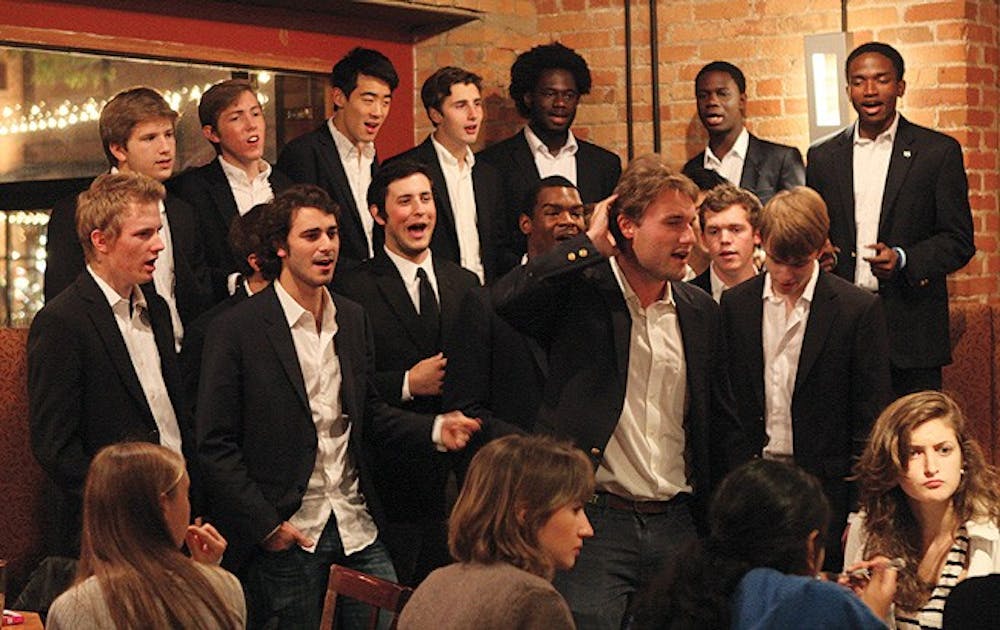On May 19th, 2009 something happened that shook the singing world to its very core: Glee stuck its socially awkward head into primetime television. A cappella mania took over like never before. Singing wasn’t just in; it was popular and benefiting from novel levels of funding and talent. For the Pitchforks’ 2011-2012 music director, Chris Waybill, this meant more competition. For you and I, this means better arrangements, more popular songs and concept albums.
For freshmen readers, the Pitchforks are one of the most dominant male a cappella groups in the nation. Besides consistently blowing the lid off of Page Auditorium, they also release an album every two years. For the past eight years the group has enlisted an eccentric, award-winning and sweatpants-wearing mad scientist to produce their albums. With his help the group has earned national recognition in a handful of categories from The Contemporary A Cappella Society (the authority on all things cappella). Among the awards littering the Pitchforks’ oversized trophy-case are Best Male Collegiate Album awards from 2006 and 2008 as well as a runner-up award from 2010. Why didn’t they win with their last album? Glee has increased the baseline for music groups and the Pitchforks were crowded out. I can imagine Chris Waybill chuckling, casually readjusting his tie, and saying something like, “Well, that was last album.”
For the 2012 album, the gloves came off and eighteen of the most talented vocalists at Duke set out to make something more than a collection of singles. I sat down with Chris Waybill to talk about the new album. Brimming with technical music jargon and unending pride, he described how each song, taken by itself and as a part of the whole, tells a story. The stories will resonate with many of the group’s college listeners coming to terms with who they are and what they want in life. For a lot of us, college is the first time s**t gets real. This album attempts to present that turbulent journey. It is aptly named Refraction—beams of bent light are a recurring motif—and it attempts to represent the many twists and changes students endure in college.
Over the course of its thirteen covered-tracks and two originals, Refraction follows the path of a man as he experiences drugs, love, jail and heartbreak. Opener “Paradise” (originally recorded by Coldplay) reflects the unsustainable, carefree existence many of us find freshman year. He continues to live the dream, sleep around, gamble and party hard in “Bright Lights Bigger City” (originally recorded by Cee Lo Green). However, as time passes he starts to see the negative consequences of this life. In “Some Nights” (originally recorded by Fun.) reality sets in, and he constantly asks a question many of us face throughout our Duke career: “What do I stand for?” Then with the help of songs by Avicii, Calvin Harris, Kanye West, Queen, Passion Pit and Bon Iver, the album describes finding love and purpose, only to end in heartbreak and despair. At the protagonist’s lowest moment, he reflects on the differences between love and lust in “Hallelujah” (they were listening to the recording by Jeff Buckley), a track which is always good for at least one soul-cleansing cry.
After the despair of “Hallelujah,” the man has nothing else to lose and feels invincible. At this point, Jay Kennedy, the Pitchforks’ soloist, performs “Titanium” (originally by David Guetta feat. Sia) and he sounds like no amateur when he snatches away Sia’s microphone and doesn’t let her finish. The album then concludes with reflection and reconciliation, closing with the title track. In this outro, selected lyrics from previous tracks melt together, become almost indecipherable, as the harmonies build and crash. The varied progression of sound mirrors the album’s narrative. From dance songs to tear-jerkers, from a bass sounding like a tuba, from a male tenor sounding like a female tenor, Refraction bends to any occasion.
Refraction isn’t a collection of watered-down covers constrained by amateur vocal cords: these are redefined classics open to interpretation. It’s an album that the Pitchforks say they’ve catered to students, and that’s not something to take for granted. Pre-ordering has already started, so buy it and share it, not because it’s the Pitchforks or a Duke music group, but because even in our post-Glee glutted market for a capella records, Refraction is among the best.
Get The Chronicle straight to your inbox
Signup for our weekly newsletter. Cancel at any time.

